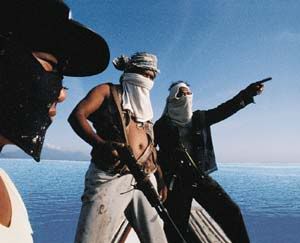
Modern Day Pirates
Danger Adrift: Modern-Day Pirates Threaten More Than the High Seas
Seagoing Crooks Shine Spotlight on Ancient Swashbuckling Profession
http://abcnews.go.com/International/story?id=1300344
Skull and crossbones buccaneers have resurfaced with "Terminator"-style tactics, shining a spotlight on an age-old crime that some experts warn could inspire terrorists.
The Carnival-owned cruise liner Seabourn Spirit recently fended off a pirate attack along Africa's eastern coast, with one person sustaining injuries. The attempt to hijack a cruise ship highlights the pirates' growing audacity -- wielding rocket-propelled grenades and machine guns, the pirates off of Somalia's coast have stolen some of the fairy-tale glamour of yesteryear's high sea thieves.
"Modern-day piracy is not Johnny Depp-inspired characters with an eye patch," said John Burnett, author of "Dangerous Waters: Modern Piracy and Terror on the High Seas." Referring to the popular swashbuckling, charcoaled-eyed Captain Jack Sparrow of "Pirates of the Caribbean," Burnett warns that 21st-century pirates plague many parts of the world and are better armed, and more brutal.
Forget about muggings at sea, pirates want the full loot, regardless of casualties, he said.
Modern-Day Buccaneers
Since March, 29 attacks have occurred off the coast of Somalia, according to the International Maritime Bureau. Although this was the first attack on a cruise ship in more than a decade, pirates attacked 205 ships in the first nine months of 2005 compared with 251 in the same period a year ago, according to the IMB's Piracy and Armed Robbery Against Ships Report.
"Although the decline in the number of attacks has decreased, some key hot spots have deteriorated like off the coast of Somalia," said Jayant Abhyankar, deputy director of the IMB, explaining that since the early '90s, crime on the high seas has resurfaced.
Indonesian waters pose the greatest danger with 61 incidents in the first nine months of 2005 and a total of 93 attacks reported in 2004, according to the IMB. Hot spots around the world include the Malacca Straits (between Malaysia and the Indonesian island of Sumatra) followed by Nigeria, Bangladesh, Iraq and the northeastern coast of South America.
And despite the falling numbers, the attacks have been more fatal. Pirates killed 30 crew members in 2004, up from 21 a year earlier.
Pirates usually work in bands but go after different targets, said Abhyankar. Some will go after any boat -- a yacht, a cruise liner or a barge -- hoping to find some good loot like the sea-faring guerrillas in Somalia. Some will hijack ships simply for the cargo while others will attack a boat to kidnap the crew in the hopes of a hefty ransom. Boats represent "easy pickings," especially off the coast of lawless countries like Somalia or in places where maritime security is weak, he said.
Terrorism on the High Seas?
Burnett commends the Seabourn's brilliant seamanship and the cruise lines' long track record of safety at sea but fears that piracy will become a terrorist tool. "When terrorists learn to hijack, kidnap passengers and crew, they will probably get involved," he said.
Merchant vessels represent an even easier target since they chug along slowly, lugging more than 95 percent of the world's goods. "The global economy could come to a screeching halt if you close off the world's choke points like the Malacca Strait," Burnett said. The strait connects the Pacific and Indian oceans and is the shortest sea route to Asian countries.
Shipping experts agree that the Seabourn incident is a wake-up call to all sailors and non-sailors.
"Most efforts to control piracy is Band-Aid stuff," said Burnett. He and others hope that the IMB, along with the United Nation's International Maritime Organization, can convince the United Nations Security Council to take action.
Despite the global decline in reported pirate attacks, he believes the number of attacks probably stands more in the ballpark of 2,000 a year versus IMB's number of 205. "It's not just about bad press or about keeping insurance premiums low, it's mostly about cost," Burnett said. It costs $20,000 to $50,000 a day to run a ship, making all stops -- even for an investigation -- expensive, lost time, he said.
That's why Unitel, a maritime security firm, recommends that all ships have armed security personnel on board or have an armed escort in power boats.
"A bank doesn't transport money without armed guards or an armored car, why should boats not be able to protect themselves?" said Unitel security adviser William Callahan.
The IMB says armed guards pose more of a risk than a safeguard. In addition, countries don't want to have foreigners impeding on their sovereign territory. And if ships are transporting volatile cargo like oil, a gunshot could lead to an explosive situation.
Armed escorts might be the better solution, but Burnett points out that securing every ship is a Herculean feat that would blow shipping costs out of the water.
Still Safe to Cruise?
So does that mean you shouldn't book a "Love Boat" cruise?
"I would take a cruise but just not in pirate territory," Burnett said. He recommends Hawaii, Alaska and yes, the Caribbean.
"Cruising is the safest way to travel and there is no reason why that is not the case today," said Michael Crye, president of the International Council of Cruise Lines.
He stressed that cruise ships screen all of their passengers and their belongings. In addition, all ships have up to 20 trained security officers on board at all times and boats have surveillance cameras and high-tech communication as well as non-lethal weapons to thwart attacks.
"The fact that this ship [Seabourn Spirit] was able to safely deliver its passengers to a safe port demonstrates the effectiveness of the security plans and countermeasures," Crye said.
In Seabourn's case, the captain out-navigated the pirates and used a parabolic audio device, a "boom box" that emits an ear-splitting sound, to ward off the attackers. Regardless, the captain was about 100 miles offshore despite IMB's warning to stay 200 miles away from the coast.
Crye said the cruise ship industry heeds the IMB's sea warnings and meets every two months with different intelligence agencies to review its security plans, and map out new cruise itineraries.
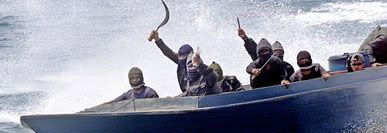
Modern pirates: Armed and ruthless
http://news.bbc.co.uk/1/hi/world/asia-pacific/724753.stm
The South China Sea is considered the most dangerous for piracy in the world.
About half of the record 285 attacks recorded by the International Maritime Bureau (IMB) last year occurred here, with Indonesia and Malaysia among the worst-hit nations.
Jayant Abhyankar, the deputy director of the IMB, told The Daily Telegraph newspaper that the increase "highlights that modern piracy is violent, bloody and ruthless".
The IMB reported that pirates world-wide in 1999 carried guns on 53 occasions and knives were used twice as often as the previous year.
Gun-battles
Approximately one-third of the world's commercial shipping passes through the South China Sea annually.
Some coastal towns in Malaysia's Sabah state, the scene of Sunday's tourist kidnappings, have been regularly targeted by armed Filipino gangs.
In September 1998, a group of armed pirates killed a fisherman in Bohayan Island in Sabah, took his boat and robbed other fishermen.
A gun-battle followed with pursuing police but the pirates escaped into international waters.
Border patrol co-operation to stem piracy has been a key feature of recent bilateral talks between Malaysia and the Philippines.
Crews murdered
Piracy has come a long way since the days of the cutlass and galleon.
Modern pirates are armed with speedboats, AK-47's and mobile phones.
In a typical attack at least 10 men in high-speed launch will follow a freighter, on which an insider has usually been planted beforehand to provide location and freight details.
Once boarded they will either hijack the ship for its cargo, or, more typically, go straight to the captain's safe, which usually contains tens of thousands of dollars in petty cash.
Sometimes the ship is repainted and given a new name, and false documents are used to create a new identity for the vessel.
Entire crews have also been known to have been kidnapped or murdered.
Last December the Chinese authorities executed 13 Chinese pirates who had been convicted of murdering 23 crew members of the cargo ship Cheung Son, which was seized just outside Hong Kong waters by pirates dressed as Chinese officials.
Photographs showing the drunken pirates celebrating the killing spree were later found by police, although the ship was never found.
The IMB's advice to ships which are being followed is to sail full speed ahead and radio for help.
It urges ships to maintain constant anti-piracy watches, even when in port.
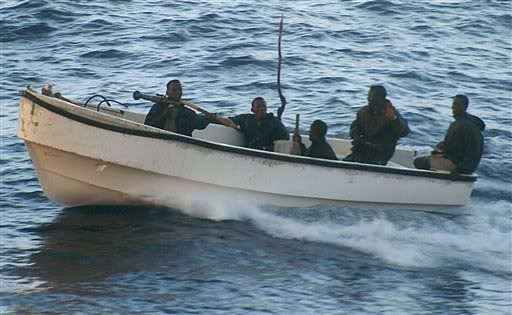
Pirate Attacks Still Frequent at Sea
http://www.cbsnews.com/stories/2005/11/16/ap/world/mainD8DTNTN06.shtml
The pirates audacious enough to raid an oil tanker off Iraq _ where the U.S. military patrols _ were anything but the stuff of romance and legend.
The three boarded armed with machine guns and knives, according to a recent report by a shipping industry agency that tracks piracy. They tied up two crew members and took three others hostage before ransacking the master's cabin and escaping with the ship's safe.
Piracy is happening with a disturbing frequency in the 21st century, as evidenced by incidents recorded by the International Maritime Bureau, a watchdog that is part of the International Chamber of Commerce.
The locations are exotic _ the South China Sea, the Malacca Strait, off southwest India's Port of Cochin. The pirates range from thugs armed with machetes and armed bars to apparently sophisticated bands.
Arild Wegener, director of the Norwegian Shipowners Association, noted a slight decline in incidents this year compared to last, but said "pirates seem to apply more violence and be more ruthless in their behavior.
"Kidnapping has become more prominent," Wegener added. "The pirates are also better equipped."
It's not just major shippers who are at risk, said Klaus Hympendahl, a German yachtsman who maintains a piracy information clearinghouse on the Web and has written a book chronicling attacks on private yachts.
When he sailed around the world in 1986, Hympendahl's only worry was the weather. Now, he cautions yachters to check the security situation along their route before they set out.
"The situation has changed completely," he said, blaming in part an increase in the number of wealthy people setting out to sea. Their well-equipped boats attract pirates looking for cash and gear.
The 1,880-mile coast of Somalia, which has had no effective government since warlords ousted a dictatorship in 1991 and then turned on each other, has emerged as one of the most dangerous areas for ships. Somali pirates have a growing reputation as well-organized, trained fighters with knowledge of the sea _ perhaps remnants of the country's navy or coast guard.
Somali pirates are not only attacking near shore but more than 200 miles into the Indian Ocean, said John Muindi, the U.N. International Maritime Organization's regional coordinator for eastern Africa.
One of the boldest attacks was on Nov. 5. Two boats full of pirates approached the Seabourn Spirit, a cruise ship carrying Western tourists, about 100 miles off Somalia and fired rocket-propelled grenades and assault rifles.
The Seabourn crew used a weapon that directs earsplitting noise at attackers, then sped away. None of the passengers, most of them Americans, was hurt, but one member of the 161-person crew was injured by shrapnel.
The next day, a cargo ship in the area also was fired on with rocket launchers and machine guns. It sped away.
Somali pirates have even hijacked three cargo ships carrying U.N. food aid for Somalis, all owned by Kenya's Motaku Shipping Agency.
The hijackings "really shook us," said Karum Kudrati, Mutaki's managing director. The company secured the release of two vessels, but a third has been held since early October as negotiations over ransom drag on.
Kudrati said relatives of the crew come to his offices seeking news.
"I tell them we have to be patient, people are working on it and we have to hope they will be released soon," he said. "You can see tears in their eyes when they come and talk to us."
In its most recent worldwide report on piracy, the International Maritime Bureau reported fewer attacks overall for the first nine months of 2005 compared to the same period last year. But there were trouble spots, it said, citing Indonesia and Somalia. An increase in serious attacks off Somalia _ 25 in the last six months _ followed a quiet spell of nearly two years.
Ali Mohamed Gedi, head of a transitional government struggling to impose order in Somalia, last month called on neighboring countries to send warships to patrol his coast, Africa's longest.
Countries in the region say they realize the problem is serious but that they have not yet discussed how to respond. Kenya, heavily involved in attempts to stabilize Somalia, would likely bear the brunt of the duties. Internal political crises elsewhere in the region, such as in Ethiopia, could pose problems.
An international force to combat piracy off Somalia will be discussed by the 166-member International Maritime Organization at its annual meeting next week in London, Muindi said.
Pirates "have to be tackled by people who are also armed like them or more or better than them," he added.
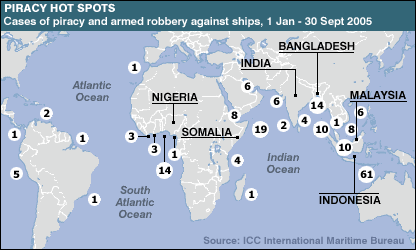
Modern Pirates Terrorize Seas With Guns and Grenades
http://news.nationalgeographic.com/news/2006/07/060706-modern-pirates.html
Piracy may seem like a romanticized scourge of the past.
In reality, piracy is flourishing from Sumatra to Somalia, and today's pirates are far from the lovable rogues who populate swashbuckling movies like the new Pirates of the Caribbean: Dead Man's Chest.
"There's nothing romantic about piracy," said Capt. Pottengal Mukundan, the director of the International Maritime Bureau (IMB), based in London, England.
"These are ruthless people who are heavily armed and prey on people that are weaker than them."
IMB is a division of the Paris, France-based International Chamber of Commerce, which combats all types of business-related crime and malpractice.
According to IMB, pirate attacks around the world tripled in the decade between 1993 and 2003.
In 2003 alone there were 445 actual or attempted attacks in which 16 people were killed.
In the first three months of 2006, there were 61 successful or attempted attacks, compared to 56 incidents in the same period last year.
At least 63 people have been taken hostage this year—twice the number of hostages taken in the same period last year.
World's Most Dangerous Waters
Modern pirates prey mostly on cargo ships but also on fishing vessels, according to IMB.
Low-end pirates may not be interested in the cargo being transported. Instead they will board a ship and hold up the crew long enough to steal the large amounts of cash that many ships carry for payroll and port fees.
More sophisticated pirates are usually members of organized gangs that may commandeer ships and hold crews for ransom.
In some cases, pirates have forced the crew off a ship and sailed it to a port, where they repaint the vessel and give it a new identity through false papers.
Another type of attack involves a coordinated effort by several boats that target a single ship.
"One boat may attack from the front," Mukundun said. "While the bridge is busy trying to avoid a crash, two other boats can sneak up from behind and board the ship."
According to IMB, the waters around Indonesia continue to be the world's most dangerous, with 19 pirate attacks in the first three months of this year.
These waters are among the most heavily trafficked in the world, and organized crime gangs hold sway over parts of them.
"Indonesia represents 25 to 30 percent of the attacks," Mukundun said.
Many attacks occur while ships slow their speeds to navigate narrow straits, such as the Strait of Malacca, a narrow stretch of water between western Malaysia and the Indonesian island of Sumatra (map of Indonesia).
Slowing down makes the ships vulnerable to being overtaken and boarded by armed men traveling in smaller motorboats.
Until recently, none of this year's attacks had occurred in the Strait of Malacca.
But within the last week three ships were attacked in the area, two of them ships carrying United Nations food aid to Aceh—an Indonesian city still suffering the ill effects of the December 2004 tsunami.
Now a crackdown on piracy by the Indonesian authorities appears to be paying off. The Indonesian navy has so far arrested numerous pirate gangs in several intelligence-led actions.
"It still remains to be seen if the situation in the Strait of Malacca has been improved in the long-term," Mukundun said.
Pirates of Somalia
If the situation has improved somewhat in Indonesia, it has gotten far worse in the waters off Somalia (Somalia facts, maps, more).
The country, which sits on the East African coast, has seen attacks shoot up from 1 in 2004 to 19 in 2005.
In June last year a ship named Semlow was transporting rice to northeastern Somalia for the UN World Food Program the New York Times reported.
Heavily armed pirates attacked the boat in the middle of the night. The ten-man crew was held hostage for 101 days before being released in October.
"These pirates are worse than the pirates we read about in history books," one of the captured crew members, Juma Muita, told the newspaper.
"These Somali pirates are better armed, and they want ransom, not just our goods."
In another Somalia incident, pirates lured a vessel close to shore by setting off distress flares.
And late last year a luxury cruise liner with some 300 tourists came under attack by Somalian gunmen in speedboats.
The pirates fired automatic weapons and rocket-propelled grenades at the cruise ship but were unable to board.
"Law-Enforcement Vacuum"
In most cases prosecuting pirates is particularly difficult, because many of the attacks take place outside the territorial waters of any state.
But attacks off Somalia are likely increasing because more pirates are taking advantage of the lack of a functioning government in the African country.
"There's a law-enforcement vacuum in Somalia into which pirates and other criminals have moved in," IMB's Mukundun said.
What's more, some of the private groups professing to fight piracy are instead reportedly engaged in it.
One such group, calling itself the National Volunteer Guard, intercepts small boats and fishing vessels in southern Somalia.
A similar group operating around the capital city of Muqdisho (Mogadishu) is known as the Somali Marines.
The problem has become so bad that IMB sends out daily signals to ships to steer at least 200 miles (322 kilometers) clear of the Somalian coast.
Mukundun says pirates usually seek to take boats within 12 miles (19 kilometers) of the Somalian coast, because the criminals know no rescue vessel from another country can legally follow beyond this border.
The U.S. Navy, however, recently started patrolling the international waters off Somalia as part of its broader antiterrorism activities in the region, according to the New York Times.
In January the U.S. destroyer Winston S. Churchill intercepted an Indian vessel far off the Somalian coast. The vessel had been secretly taken over by pirates some days before and was being used as a base for pirate attacks.
The pirates were taken into custody and transferred to Kenya, where they face trial.
Their lawyer reportedly maintains that his clients are just fishers who became stranded at sea and sought the aid of the Indian vessel.
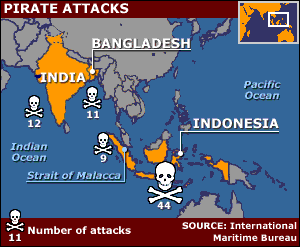
Cruise liner outruns armed pirate boats
http://www.cnn.com/2005/WORLD/africa/11/05/somalia.pirates/index.html
A luxury cruise line will re-evaluate whether to offer future cruises off the coast of Somalia after pirates attempted to attack one of its ships early Saturday.
The pirates were in two small boats and were carrying machine guns and a rocket-propelled grenade when they attempted the attack on Seabourn Cruise Lines' "Spirit" about 5:35 a.m. local time Saturday, Deborah Natansohn, president of the cruise line, told CNNRadio.
The ship was carrying 150 passengers and a crew of about 160.
The ship, she said, immediately instituted its emergency response system. "The occupants of those boats did not succeed in boarding the ship and eventually turned away ... our captain and crew did a terrific job taking responsive action."
Passenger Mike Rogers of Vancouver, Canada, said the pirates were shooting and sending rockets at the boat. (Watch how cruise ship outran pirates -- 1:28)
"The captain tried to run one of the boats over, but they were small boats, about 25 feet long," he told CNNRadio affiliate CKNW in Vancouver.
"Each one had four or five people on it, and (the captain) said he was going to do anything to keep them from getting on board."
The captain, however, did not hit the alarm button to alert passengers of the emergency, Rogers said. "He announced it over the speakers because he was scared people would run up on deck, and he didn't want people on deck because they would have been shot."
The cruise ship eventually outran the pirates' boats, Natansohn said. One person suffered minor injuries, she said without elaborating.
"There's some minor damage done to the ship," Rogers said. "There's no water right now, for instance, in some places, and I believe one of the grenades actually went off in one of the cabins, but everyone on board is fine."
The ship is now en route to the Seychelles Islands, Natansohn said.
On Thursday, the United Nations' World Food Program warned that hijackings off the coast of Somalia were restricting the delivery of needed food assistance to the country.
"The southern Somali coastline is one of the most dangerous in the world," the WFP said on its Web site. "In recent months, WFP's operations in Somalia have been sabotaged by the hijackings of two vessels carrying relief food. Ship owners are now demanding armed escorts to travel in these waters."
Natansohn said efforts were under way Saturday to locate the pirates. "We have notified U.S., Canadian and Australian authorities because most of our passengers come from those three countries, as well as local authorities in Africa."
"Seabourn 'Spirit' has offered itineraries in that part of the world before, but we'll obviously be looking at the incident to determine what to do in the future," she said.
Rogers said, "We're always looking for adventure, but this is probably a little more than we would normally look for."

Pirate attacks up worldwide
http://news.yahoo.com/s/ap/20071016/ap_on_re_as/pirate_attacks;_ylt=Ao4zdd9873vXvEhuNNW_MrtvaA8F
KUALA LUMPUR, Malaysia - Maritime pirate attacks worldwide shot up 14 percent in the first nine months of 2007 from a year earlier, with Somalia and Nigeria showing the biggest increases, an international watchdog said Tuesday.
While Africa remains problematic, Southeast Asia's Malacca Strait, one of the world's busiest waterways, has been relatively quiet, the International Maritime Bureau said in its report.
A total of 198 attacks on ships were reported between January and September this year, up from 174 in the same period in 2006, the IMB said.
It said a total of 15 vessels were hijacked, 63 crew kidnapped and three killed.
In the July to September period alone, there were 72 incidents, up from 47 in the same period a year earlier, marking the second straight quarterly rise in attacks, the London-based IMB said through its piracy reporting center in Kuala Lumpur, Malaysia.
"If this current trend continues, it would appear that the decline in piracy attacks since 2004 has bottomed out," it warned.
Indonesia remained the world's worst piracy hotspot, with 37 attacks in the first nine months of 2007 — but that was an improvement from 40 in the same period a year earlier, the IMB said.
Attacks rose rapidly in Somalia to 26 reported cases, up from only 8 a year earlier, it said. Somalia's U.N.-backed government has been struggling to assert control over the country since it accepted the aid of Ethiopian soldiers to chase a powerful Islamic alliance from power.
Nigeria also suffered 26 attacks so far this year, up from 9 previously.
IMB director Pottengal Mukundan urged ships to stay as far as possible from the coasts of Somalia and Nigeria, which remained dangerous with large numbers of violent kidnappings.
"The level of violence in high risk areas remain unacceptable. Pirates in Somalia are operating with impunity, seizing vessels hundreds of miles off the coast and holding the vessel and crew to ransom, making no attempt to hide their activity," he said.
Only four attacks were reported in the Malacca Strait this year, compared to 8 in the same period in 2006, thanks to increased cooperation between states straddling the waterway, the IMB said.













![Brotherhood" (2006) [TV-Series]](http://photos1.blogger.com/x/blogger2/1421/379621144723082/211/z/425926/gse_multipart33129.jpg)







No comments:
Post a Comment